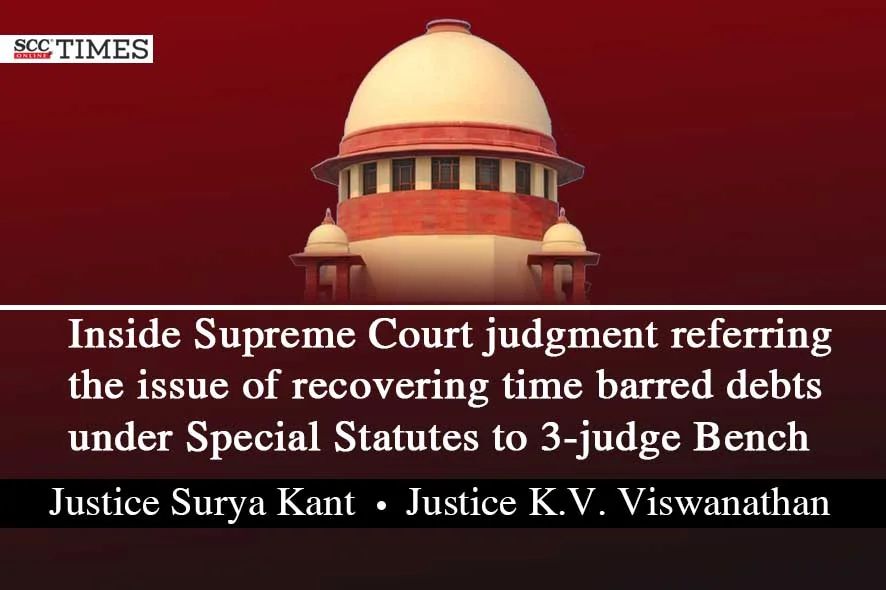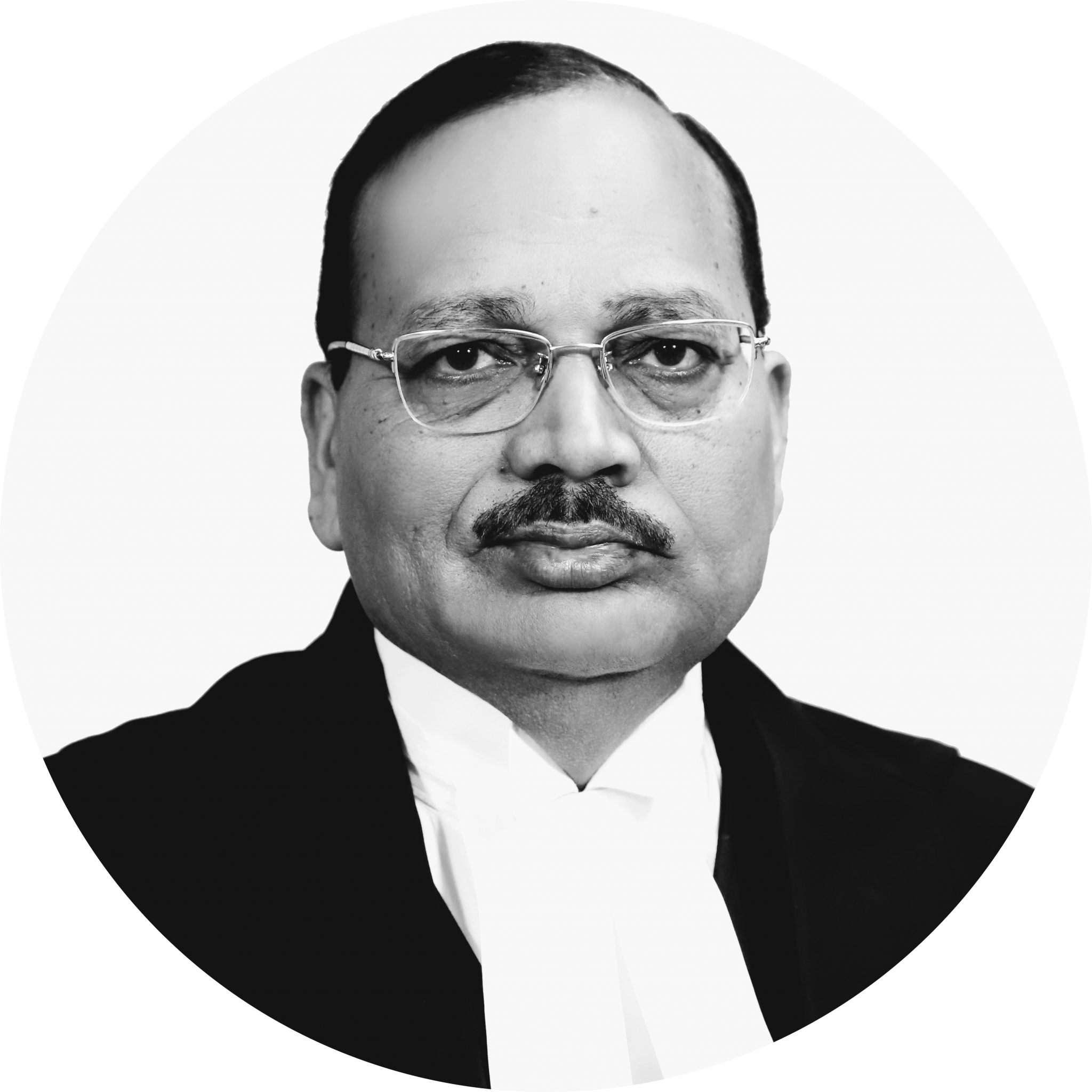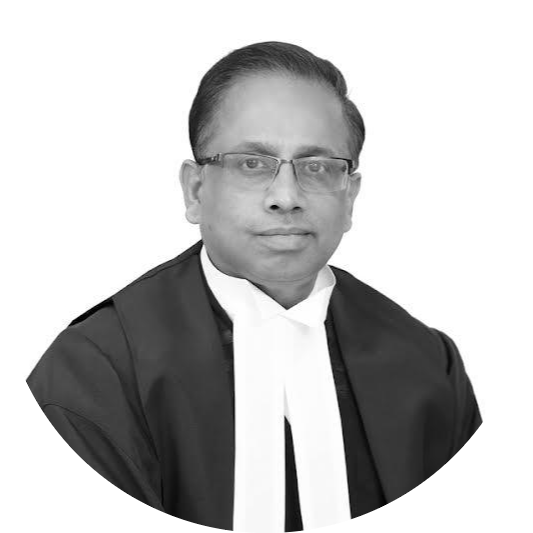Supreme Court: In an appeal against the judgment of Punjab and Haryana High Court, wherein the Court rejected that if a debt is time-barred under the Limitation Act, 1963, the same cannot be recovered by resorting to the Haryana Public Moneys (Recovery of Dues) Act, 1979 (‘ Recovery of Dues Act’) read with the State Financial Corporations Act, 1951, the division bench of Surya Kant and K.V. Viswanathan, JJ. has opined that, for a comprehensive consideration and an authoritative pronouncement, the matter needs to be placed before the Chief Justice of India to constitute an appropriate three-judge bench. Thus, the matter was referred to a larger bench.
Issues and Analysis:
-
Are the appellants right in contending that the recovery proceedings initiated against them under the Recovery of Dues Act are barred in view of the principle laid down in State of Kerala v. V.R. Kalliyanikutty, (1999) 3 SCC 657?
The Court took note of V.R. Kalliyanikutty (supra), wherein it was held that the Kerala Recovery Act did not create any new right and that it merely provided a process for speedy recovery. Since the Act did not create any right, the person claiming recovery cannot claim recovery of amounts which are not legally recoverable. Thus, under the Kerala Revenue Recovery Act, a debt barred by the law of limitation cannot be recovered.
The Court reiterated that the laws of limitation only bar the remedy and do not extinguish the right, except in cases where title is acquired by prescription.
The Court noted that the impugned order, in the present case, held that the machinery for recovery under the Recovery of Dues Act or the State Financial Corporations Act do not have the trappings of a Court to hold that the provisions of the Limitation Act have no application for the same.
The Court viewed that the findings of the High Court in the impugned order do not directly address the holding in V.R. Kalliyanikutty (supra), that the Kerala Revenue Recovery Act did not create any additional right to recover and enforce the outstanding amounts due.
-
Do the State Financial Corporations Act, 1951 and the Recovery of Dues Act create a distinct right and provided an alternative mechanism of enforcement to recover the amount due, even if the amounts due were time barred?
The Court examined the relevant statutory provisions and the objects and reasons of the State Financial Corporations Act. The Court also took note of Section 2(c) and Section 3 of the Recovery of Dues Act.
After taking note of Section 32-G of the State Financial Corporations Act, the Court said that the Section confers a right of recovery on the financial corporation, without prejudice to any other mode of recovery which includes the right to file a suit. The conferment of such a right to recover an ‘amount due’ as arrears of land revenue, notwithstanding any other remedy, is for a public purpose and in the public interest.
After referring to Salmond on Jurisprudence, 12th Edition, on the concepts of “Right” and “Power”, the Court noted that debt is not the same thing as the right of action for its recovery. While the debt is the right in the creditor with the corelative duty on the debtor the right of action for recovery is in the nature of a legal power. Thus, the Bench said that while the process of filing a civil suit may be barred because of the statute of limitation, the power to recover vested through Section 32-G of the State Financial Corporations Act read with Section 2(c) and Section 3 of the Recovery of Dues Act is a 23 distinct power which continues notwithstanding that another mode of recovery through a civil suit is barred. Therefore, there is an additional right to enforce the claims of the financial corporations notwithstanding the bar of limitation.
The Court said that even where the statute of limitation does not apply, the power must be exercised within a reasonable time.
The Court further discussed the decision in V.R. Kalliyanikutty (supra), and said that under Section 71 of the Kerala Revenue Recovery Act, the Government in public interest could make the Revenue Recovery Act applicable to recovery of amounts due to any person or class of persons or to any specified institution or any class or classes of institutions and on such notification by the provisions of the Act was applicable to such recovery.
The Court viewed that while the Court focused on the implication of a notification under Section 71 of the Kerala Revenue Recovery Act where under the Government could declare the Act applicable to any institution, the attention of the Court in V.R. Kalliyanikutty (supra) was not drawn to the powers envisaged under the State Financial Corporations Act which were also applicable to the recovery of debts in Kerala.
The Court noted that in V.R. Kallliyanikutty (supra), it was held that the words ‘amounts due’ occuring in the Kerala Revenue Recovery Act would only include legally recoverable debts i.e. debts which are not time-barred.
The Court said that while it is true that the U.P Act, similar to the Haryana Revenue Recovery Act or the Kerala Revenue Recovery Act, was enacted with the object to have speedy recovery of dues, this does not take away from the fact that the right was vested in the Financial Corporations to recover the loans through the said Acts, notwithstanding any other right, including the right to file a suit.
Concerning the finding in V.R. Kalliyanikutty (supra) regarding Section 70(3) of the Kerala Revenue Recovery Act, which provides for a suit by the debtor for refund after payment under protest, the Court noted that the defence for the State Financial Corporations that the State Financial Corporations Act conferred an additional right to recover amounts due would still be applicable. Therefore, the existence of the right to the debtor under Section 70(3) of the Kerala Revenue Recovery Act cannot be said to be determinative of the issue.
Further, the Court took note of K.C. Ninan v. Kerala SEB, 2023 SCC OnLine SC 663 ,wherein it was held that the power to initiate proceedings to recover the electricity dues was independent of the power to disconnect electrical supply. After tthe decision in V.R. Kalliyanikutty (supra), the Court concluded that the statute of limitation only barred a remedy, while the right to recover the loan through ‘any other suitable manner provided’ remains untouched. Thus, the bar of limitation under Section 56(2) of the Electricity Act would only restrict the remedy of disconnection under Section 56 of the Electricity Act and that the Electric Utilities were entitled to recover electricity arrears through civil remedies or in exercise of its statutory power.
Thus, the Court opined that, for a comprehensive consideration and an authoritative pronouncement, the matter needs to be placed before the Chief Justice of India to constitute an appropriate three-judge bench.
CASE DETAILS
|
Citation: Appellants : Respondents : |
Advocates who appeared in this case For Petitioner(s): For Respondent(s): |
CORAM :





